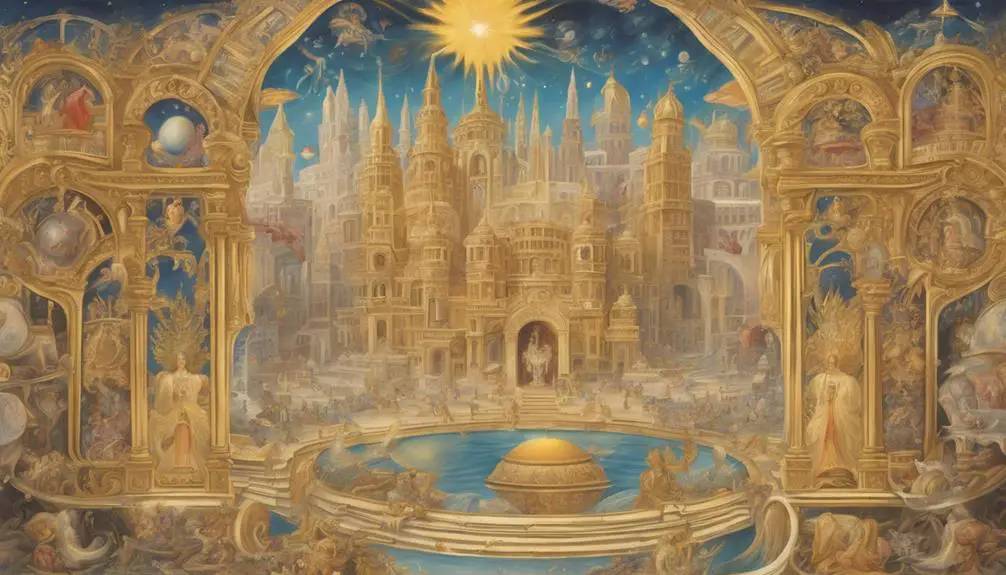Gain insights into biblical verses that portray Heaven, exploring contrasts between Old and New Testament perspectives; a divine journey awaits your curiosity.

What Verses in the Bible Talk About Heaven
Drawing upon the eloquence of John Milton's Paradise Lost, you may have wondered about the true depiction of Heaven as per the Bible. Let's embark on a journey together to explore the different verses that paint vivid images of this celestial realm.
From the tranquil gardens in Genesis to the radiant city in Revelations, the Bible offers a myriad of perspectives. Intrigued to know more about how the New Testament's perspective differs from that of the Old Testament? Stay tuned, it's going to be quite a revelation.
Key Takeaways
- Genesis introduces heaven as part of God's creation and a place for divine communication.
- Psalms presents heaven as a place filled with glory, righteousness, joy, and eternal pleasures.
- The New Testament provides a relational view of heaven, highlighting its treasures and the prepared place for believers.
- Parables in the Bible use metaphors to depict heaven's growth, value, and inclusiveness as part of God's Kingdom.
Depictions of Heaven in Genesis

Diving into the book of Genesis, you'll find subtle yet profound depictions of heaven, which lay the groundwork for the biblical understanding of this celestial realm. Genesis portrays heaven not as a physical location, but as a spiritual dimension that coexists with our earthly reality.
Genesis 1:1, the very first verse of the Bible, introduces heaven as part of God's initial creation. Here, heaven is intertwined with the concept of the 'beginning,' signifying an eternal, timeless existence. You'll notice that Genesis doesn't provide an exact geographical or physical description of heaven. Instead, it emphasizes its function and identity. Genesis 28:12-19 presents heaven as a place of divine communication, where God's promises to Jacob were conveyed through a dream about a ladder reaching to heaven.
Moreover, heaven, in Genesis, is depicted as a dwelling place for divine entities. Genesis 21:17 refers to 'the voice of the lad' coming from heaven, while Genesis 22:11 sees an angel of God calling to Abraham from heaven. These instances suggest that heaven isn't just a place but also a means of divine intervention and guidance. This abstract, functional portrayal of heaven sets the theological foundation for its subsequent depictions in the Bible.
Heaven's Description in Psalms

Shifting our focus to the book of Psalms, you'll discover numerous depictions of heaven, each offering a unique perspective on this divine realm. The Psalms, imbued with poetic beauty and rich imagery, portray heaven as a place of majesty, righteousness, and joy.
Psalms 19:1, for example, elucidates the grandeur of the heavens, proclaiming, 'The heavens declare the glory of God; the skies proclaim the work of his hands.' Here, the psalmist presents heaven as a testament to God's glory, a magnificent display of divine craftsmanship.
In Psalms 89:14, heaven is depicted as a place where righteousness and justice are the foundation, manifesting God's moral order. It's here that God's faithfulness and love are realized fully.
Psalms 16:11 goes even further, suggesting that heaven is where fullness of joy and eternal pleasures reside, 'You make known to me the path of life; in Your presence is fullness of joy; at Your right hand are pleasures forevermore.'
These verses are but a few examples of how Psalms presents heaven. Each verse adds a new layer to our understanding, painting a multifaceted image of this divine abode.
New Testament's Perspective on Heaven

Moving from the Old Testament's poetic portrayals of heaven, we now turn our attention to the New Testament's interpretation of this divine realm. Here, heaven is often depicted as the Kingdom of God, a place not only of unparalleled beauty but also of righteousness and peace. You'll find that the New Testament provides a more relational view of heaven, emphasizing our union with Christ in the afterlife.
The following table presents a few key verses along with their interpretations:
Verse |
Interpretation |
|---|---|
Matthew 6:20 |
Describes heaven as a place where treasures are stored, suggesting its eternal value. |
John 14:2 |
Jesus assures His followers that He is preparing a place for them in His Father's house, signifying heaven as a prepared place for prepared people. |
2 Corinthians 5:1 |
Affirms the believer's hope of a heavenly dwelling that is eternal. |
Philippians 3:20 |
Reminds us that our true citizenship is in heaven, emphasizing the believer's eternal relationship with Christ. |
Revelations: Vision of Heaven

In the book of Revelation, you'll encounter John's awe-inspiring vision of heaven, a celestial spectacle that offers the most vivid and detailed description of the divine realm in the entire Bible. This prophetic book provides you with an unparalleled glimpse into the celestial city, described as a place of pure radiance, where God's glory outshines even the sun.
John's vision, as chronicled in Revelation 21 and 22, presents heaven as a 'new Jerusalem', coming down out of heaven from God, prepared as a bride adorned for her husband. The city's grandeur is eloquently depicted with walls of jasper, streets of pure gold, and gates of pearl. This is a place where sorrow, pain, and death have no dominion – a realm of eternal peace and joy.
One can't help but marvel at the imagery employed by John, from the river of the water of life, clear as crystal, to the tree of life bearing twelve crops of fruit. It's a vision that encapsulates the ultimate hope of Christianity – the promise of an eternal, glorious dwelling place with God. This is indeed a profound portrayal of heaven in the Bible.
Interpreting Parables About Heaven

As you delve into the parables about heaven, it's essential to note that they require careful interpretation, often employing metaphors and symbolism to depict the kingdom of God in ways that transcend our earthly understanding. These parables challenge you to perceive realities far removed from our earthly experiences, allowing us to glimpse the divine from a human perspective.
Consider the following table that summarizes key parables, their metaphors, and the heavenly realities they depict:
Parable |
Metaphor Used |
Heavenly Reality Depicted |
|---|---|---|
The Mustard Seed |
Mustard Seed's growth |
God's kingdom starts small but grows extensively |
The Hidden Treasure |
Buried treasure |
The immense value of God's kingdom |
The Great Banquet |
Wedding feast |
The inclusiveness of God's kingdom |
Analyzing these parables, you'll notice the abstract concepts they present about heaven. The mustard seed's growth signifies how God's kingdom, though it may start small in one's life, can grow to a large extent. The hidden treasure metaphor demonstrates the indescribable worth of God's kingdom, suggesting that it's worth giving up everything else to possess it. Finally, the great banquet parable underlines the inclusiveness of God's kingdom, indicating that it's open to everyone. Interpret these parables thoughtfully to enrich your understanding of the heavenly kingdom.
Conclusion
In essence, the Bible presents a vivid image of heaven, be it Genesis' early depictions, Psalms' poetic descriptions, or the New Testament's insights.
Revelations offers a particularly breathtaking vision. Parables provide a more nuanced, interpretive view.
Ultimately, understanding these verses isn't just about picturing a celestial paradise; it's about grasping God's promise of salvation, eternal love, and ultimate reunion.
So, delve deeper, seek understanding, and find comfort in these divine assurances.



Sign up